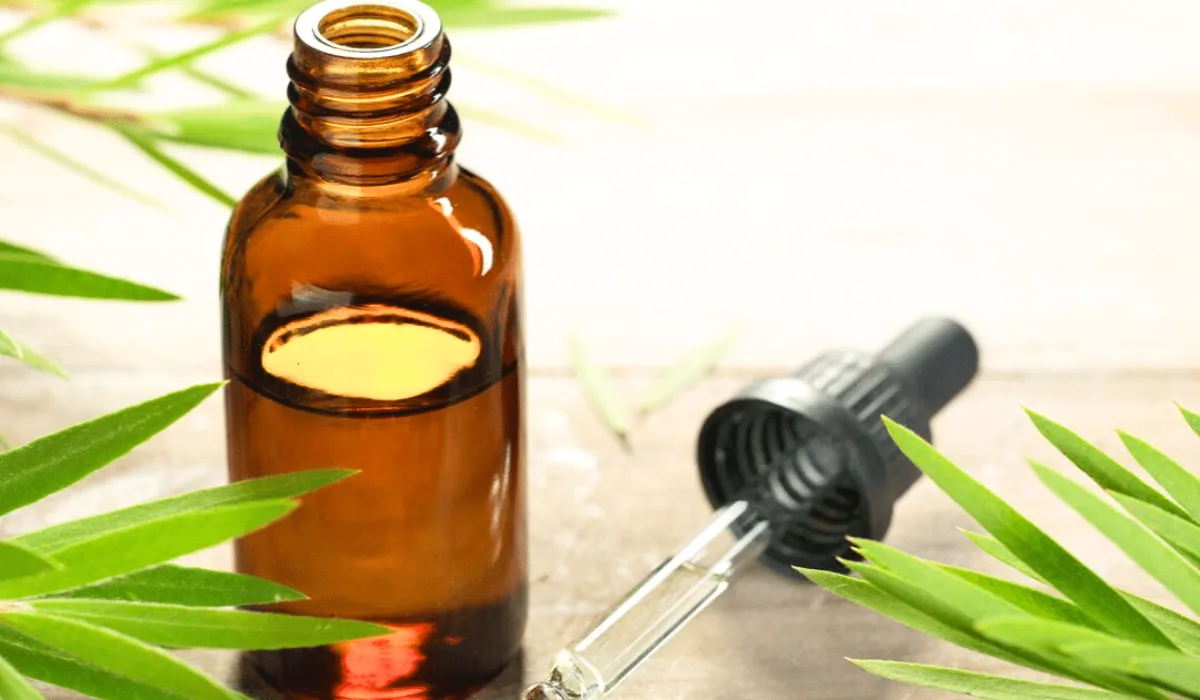The problem of acne happens to be a very annoying one for many. Coping up with acne problems is a very challenging matter. There are different types of treatments presently available for acne issues.
However, rather than going for cosmetic treatments trusting in organic materials can be useful enough. The tea tree oil happens to be one such solution one can opt for in case of severe acne issues. This article is a discussion of this matter and more.
Understanding Acne: Causes And Types

You must understand acne to understand tea tree oil. Oil and dead skin cells restrict hair follicles, causing blackheads, whiteheads, and pimples. Genetics, hormones, and drugs affect this skin disease. Choosing a remedy for acne requires determining its type. Deathly skin cells and sebum from the skin’s sebaceous glands block hair follicles, causing acne. Clogged follicles let bacteria, mainly Propionibacterium acnes, proliferate, causing irritation and acne. High sebum production during puberty, pregnancy, and periods increases acne risk. Genetics also cause acne. If both parents had acne, so may their kids.
Acne can also result from corticosteroids and lithium. Customize acne therapy by type and severity. Knowing the causes of mild blackheads, inflammatory pimples, and cystic acne helps people adopt a skincare routine. Antibacterial tea tree oil may treat acne naturally and targetedly.
Benefits of Tea Tree Oil
Australian Melaleuca alternifolia tree leaves produce antibacterial and anti-inflammatory tea tree oil. Key component terpinen-4-ol may enable its antimicrobial actions. Tea tree oil targets acne-causing bacteria on the skin to relieve inflammation. Tea tree generates most of this precious oil. Australian tea tree leaves are carefully distilled for their strong oil. Traditional medicine and modern skincare relied on its acne-fighting properties. The main antibacterial element in tea tree oil is terpinen-4-ol. This bioactive ingredient is crucial for battling acne-causing germs. Targeting acne-causing bacteria, tea tree oil naturally clears skin.
Tea tree oil penetrates the skin to suppress Propionibacterium acnes, which causes acne and inflammation. Due to its anti-inflammatory properties, tea tree oil lowers acne redness and pain. Natural and holistic acne treatment using tea tree oil. Tea tree oil prevents bacteria and inflammation for clearer skin.
How to Apply Tea Tree Oil for Acne?
Use tea tree oil properly to maximize benefits and avoid pain. Use a mild cleanser to remove makeup and debris to start your skincare routine. Direct usage of pure tea tree oil may be overly concentrated. Fix this by diluting a little pure tea tree oil with a carrier oil. Dilution simplifies application and decreases irritation. Use a cotton swab or fingertip to apply diluted tea tree oil. Pat or massage the solution into the skin to absorb.
On acne-prone areas, targeted application boosts oil’s antibacterial and anti-inflammatory properties. Tea tree oil labels must be obeyed. Due to their concentrations, these cleansers and creams must be used properly. Patch testing is recommended before using tea tree oil. Apply a small amount of the diluted combination or tailored product to a discreet area to test skin tolerability before widespread use. This prophylactic measure detects adverse reactions and makes tea tree oil skin-friendly.
Incorporating Tea Tree Oil into Your Skincare Routine
Use tea tree oil in your skincare routine for optimum results. Add a few drops of tea tree oil to your preferred moisturizer or cleanser. This seamless connection ensures consistent application, reducing breakouts and boosting skin health. Customizing skin care for acne skin with the oil supports comprehensive skin health. Tea tree oil works all day when infused into moisturizers. Instead, use it with your cleanser to fully cleanse and evenly distribute the oil’s benefits. Consider tea tree oil’s drying effects. Adjust concentration based on skin response. Start with a little tea tree oil and add more as needed, checking your skin.
You can gradually add tea tree oil to your routine to minimize negative effects and maximize benefits. Regular tea tree oil use reduces breakouts by keeping skincare consistency. Tea tree oil’s antibacterial and anti-inflammatory properties fight acne-causing germs and soothe skin.
When to Seek Professional Advice?
You can treat acne using tea tree oil, but you should know when to seek expert aid. Severe or chronic acne or suspicious indications require a dermatologist. These skincare experts can evaluate your skin, create a treatment plan, and recommend tea tree oil. Tea tree oil has antibacterial and anti-inflammatory properties, although the severity and characteristics determine its usefulness.
Due to their expertise in skin disorders, dermatologists can diagnose acne and recommend treatments that match your needs. Acne with additional symptoms or that resists OTC therapies requires professional intervention.
Dermatologists can diagnose hormone abnormalities and skin diseases that require customized treatment. A dermatologist can recommend tea tree oil for skincare. Ideal concentrations, formulations, and therapy combinations may be suggested. This personalized approach assures tea tree oil promotes acne treatment.
Conclusion
As more time passes more and more dermatologists prefer organic solutions for acne issues. According to them, tea tree oil is one of the best anti-inflammatory solutions that help reduce acne issues to a considerable level. For ensuring a cleaner and healthier skin making use of the tea tree oil is proving to be much useful in all its entirety.
References:
- Nurzyńska-Wierdak R., Pietrasik D., Walasek-Janusz M.W. Essential oils in the treatment of various types of acne—A review. Plants. 2023;12:90. doi: 10.3390/plants12010090. [PMC free article]
- Amorati, R., Foti, M. C., & Valgimigli, L. (2013). Antioxidant activity of essential oils. Journal of agricultural and food chemistry, 61(46), 10835-10847. doi: 10.1021/jf403496k

